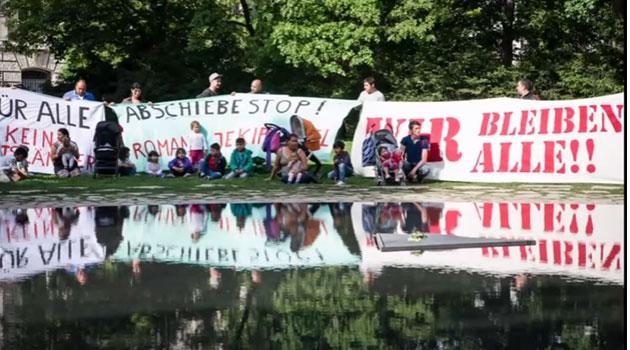Germany: Roma at risk of being returned to the Balkans continue to protest

"Solidarity with Romani people expelled from the memorial dedicated to the Sinti and Roma murdered during Nazism" – under that slogan a demonstration was held on 3 June on the Alexanderplatz in Berlin. The plan was to occupy the memorial to the Roma Holocaust in the Tiergarten near the neighborhood in the German capital that houses all of the government offices.
"Since Germany wants to deport us, and because we have no other choice, we occupied the memorial to the Sinti and Roma murdered during Nazism on 22 May 2016, in other words, a site that is meant to remind the world of our deported and murdered great-grandparents. Politicians should be ashamed of themselves," reads a declaration from the Hamburg-based group Romani Jekipe Ano sent to the media last week.
"Shortly after midnight our protest was forcibly ended, they beat up our children at that site and made threats against them. Our children did not deserve that. We are concerned that our grandchildren, too, will experience deportation, racism and violence. We will never allow that," the authors of the declaration explain.
For those reasons, the demonstrators have planned to return to the memorial. The fact that police might again remove them from the site is a price they are willing to pay.
Ongoing dispute about the protest location
As news server Romea.cz previously reported, some representatives of the German Sinti disagree with the occupation of the remembrance site for the purposes of political protest. The Central Council of German Sinti and Roma issued a press release at the end of May about the demonstration, stating: "That memorial is a place for the dignified commemoration of more than half a million murdered Roma and Sinti in Nazi-occupied Europe. The site must not be and should not be abused for the purposes of political protest actions."
The protesters, however, disagree with that argument. "It is the correct place! We chose it on the basis of our respect for our ancestors murdered during Nazism and in honor of their memories. When will Germany finally respect us Sinti and Roma as human beings? We Roma do not have our own country, but we do have a right to a dignified life," the protesters responded to the Central Council’s statement.
Systematic exclusion from society equal to persecution
Romani Rose, the chair of the Council, fully comprehends the demonstrators’ perspective. "Serious, violent antigypsyism in the countries of southeastern Europe makes a dignified life there impossible and is a cause for Romani people to flee. The stigmatization of Romani people seeking asylum in Germany by calling them ‘economic migrants’ in the media or in political discourse is based on antigypsyist motivation," Rose said, adding that all of the relevant reports on the issue from the European Council confirm the many years of criticism that has been expressed by the Central Council that "the situation of Romani people in the states of the Western Balkans is marked by systematic disadvantage and exclusion that, taken as a whole, achieves the dimensions of persecution."
According to the participants in the blockade at the memorial, the Balkan countries to which they are meant to return are not safe for them as Roma. "Our lives are at risk there. We are systematically isolated and excluded from society, persecuted, and subjected to arbitrary treatment politically," their statement reads.
"The declarations of politicians about solidarity, the promises made by those who were then responsible for expelling the Roma from the memorial, must not remain empty words. We will stay at the entrance to the memorial as long as it takes until we are able to assert our rights," the protesters’ statement reads.
Celebrate, yes, protect, no
The Roma asylum-seekers are critically referring in their statement to the extravagantly organized celebration of International Roma Day on 8 April in Berlin this year, which was held directly at the memorial in question. The event was attended, for example, by German President Joachim Gauck; Minister for Migration, Refugees and Integration Aydan Özoğuz; Romani Rose; Arne Friedrich, a former footballer who represented Germany internationally; MEP Soraya Post, a Romani woman from Sweden; Mark Dainow, the vice president of the Central Council of Jewish People in Germany; a Sinti survivor of the Auschwitz-Birkenau extermination camp, Zoni Weisz; and by other leading figures in public life from around Europe.
Jožka Miker, a Romani activist from the Czech Republic, also spoke on the podium at that event in Berlin. During the celebration, Minister Özoğuz strongly defined herself as against anti-Romani tendencies in society.
"In our society there must not be room for antigypsyism," the minister said on 8 April. Since most of the promises from the politicians and Romani representatives made on International Roma Day remain unfulfilled as of yet, the protests by Romani people who are currently at risk of deportation from Germany will apparently not be so easy to quell.
On 5 June, Al-Jazeera reported that approximately 100 demonstrators protesting the asylum policy had marched to the memorial in order to continue their awareness-raising. That reporting summarized the German government’s moves to amend its asylum law since November 2014, when Albania, Montenegro and Kosovo were added to the "safe countries of origin" list, which makes it extraordinarily difficult for citizens of those countries to receive asylum in Germany.
Al-Jazeera reported that in October 2015 the Government added Bosnia and Herzegovina, Macedonia, and Serbia to that list. Deportations of citizens of those countries tripled in 2015 compared to 2014, and the rate of deportations has reportedly continued to accelerate.
Last week’s demonstration included adolescent participants, including a Romani teenager who fled Serbia back in 2011 together with her mother and brother, and who has been attending school in Berlin and learning German. She told Al-Jazeera she is afraid to return to Serbia, but her entire family could be deported at any moment, as their asylum application has been rejected.